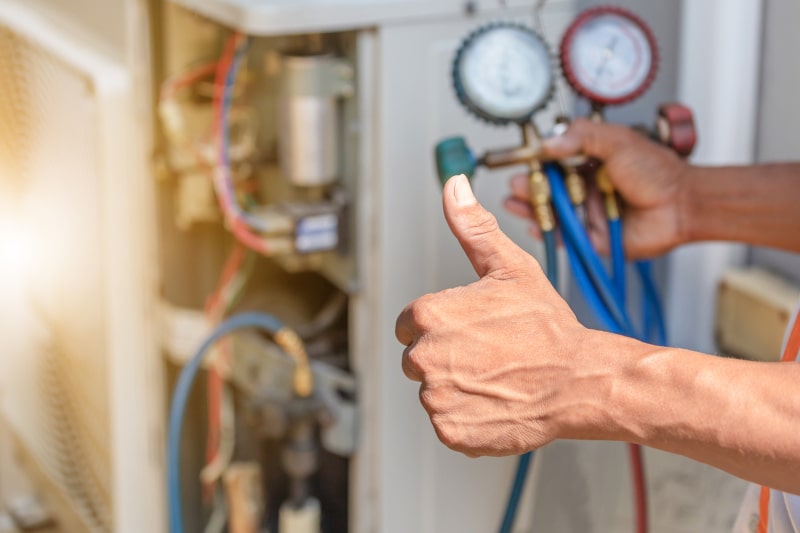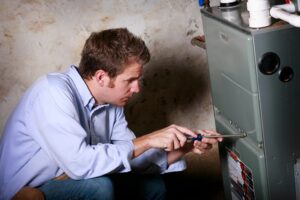As you prepare for the warmer weather here in Allentown, PA, it’s time to have your HVAC system checked. Your system needs maintenance services to check for any possible problems and ensure it remains efficient for the hot summer. Here we will give you a complete guide to spring HVAC maintenance that should be completed by a professional HVAC technician.
Clean the Outdoor Unit
The HVAC system comes with an outdoor condenser unit that collects debris over time. Due to the harsh winter weather, debris can build up inside the system and lower its effectiveness. Now that spring is here, ensure you clean and clear the area surrounding it.
Plants, such as decorative flowers, should be at least 3 feet away from the unit. Although you can clean the outside of the system by yourself, don’t open the inside. The inside requires services from a trained HVAC professional to prevent damaging components.
HVAC Maintenance Includes Replacing the Air Filters
HVAC experts recommend changing air filters every one to three months, depending on several aspects, such as the number of people and pets in the house. If neglected, they clog with dirt and allow some of it through, which lowers your indoor air quality. Dirty HVAC filters also restrict airflow, forcing your system to work more than it should.
As a result, the system consumes more energy, which increases your monthly utility bills. Now that winter is winding down, the technician will change the filters. Many homeowners are comfortable changing their filters every 3 months or so.
Check for Refrigerant Leaks
Your AC contains a refrigerant solution that runs through a conduit and uses it to cool your home. Due to many reasons, it could get damaged and leak the refrigerant. When this happens, the AC is unable to function properly and reduces your comfort.
The leaks not only affect the performance but also harms the environment. For this reason, your technician inspects for potential leaks and repairs them. He also refills it to recommended levels for maximum performance.
Check and Clean the Ductwork
The ducts running across your home carry conditioned air from your heating and cooling system. They may develop holes and misalignments that leak the air and lower the system’s efficiency. As a result, you could incur expensive energy bills.
If the holes are in the basement, this means that the system is essentially heating and cooling the wrong place.
Leaky ductwork can also have particles accumulate and clog the ducts. They block the airflow and promote wear and tear of components. However, through spring HVAC maintenance tune-ups, your technician checks the ducts.
Clean the Condenser and Evaporator Coils
Your system’s indoor air handler contains an evaporator, while the outdoor unit has a condenser coil. The evaporator coil draws heat from the air while the condenser cools the hot refrigerant. It also removes and condenses water vapor to keep your humidity levels in check.
Over time coils collect dust, which reduces their efficiency and overall performance of your HVAC system. However, with spring maintenance, you ensure that both are clean and ready for the summer heat.
Check the Condensate Drain
Your system drains the condensed water vapor through a condensate drain. It may clog, resulting in water filling the drain pan and perhaps causing damage. Additionally, it stops the system from cooling or even shuts off until it’s cleaned.
During the bi-annual HVAC maintenance, the condensate line is inspected and cleaned to mitigate possible problems. To avoid inconveniences, contact an HVAC contractor for professional cleaning and repairs.
HVAC Maintenance Tests the Air Conditioner
Spring is the time to check and test the cooling functionality of your HVAC system. To do this, your technician first sets higher temperatures on the thermostat and observes what happens next. If it fails to produce cool air through the vents, it has a problem that needs immediate attention.
It could also produce some strange noises, that need attention. If ignored, such issues could lead to system failures when you need it most. They also cost you more in repairs and replacement of components.
The issues mentioned above are a few of what to expect during spring HVAC maintenance tune-up. A certified technician will check other things such as airflow and electrical components. For more information about our HVAC maintenance plan, or to schedule your spring tune-up, contact Sullivan Oil and Propane.
Image provided by iStock



